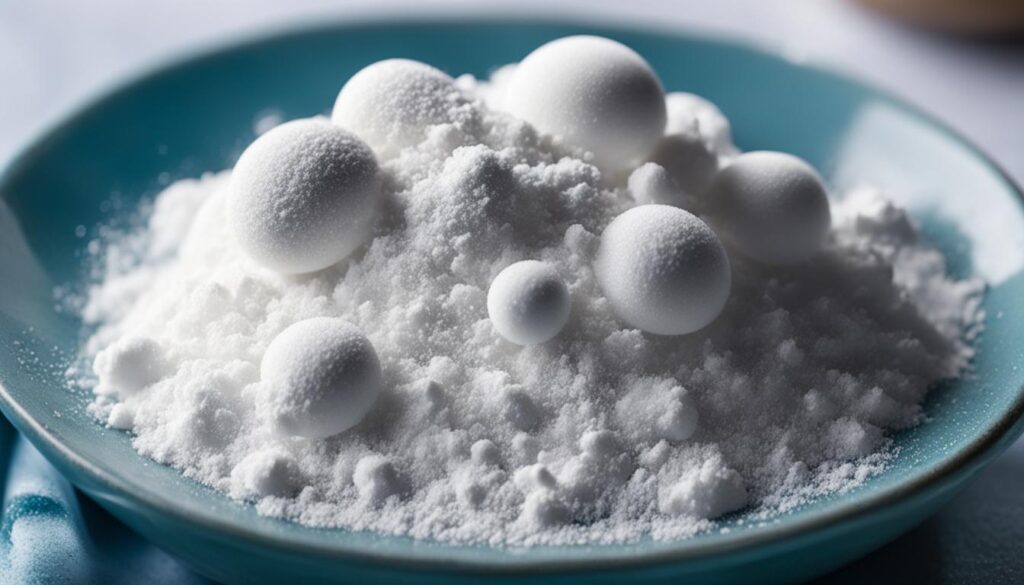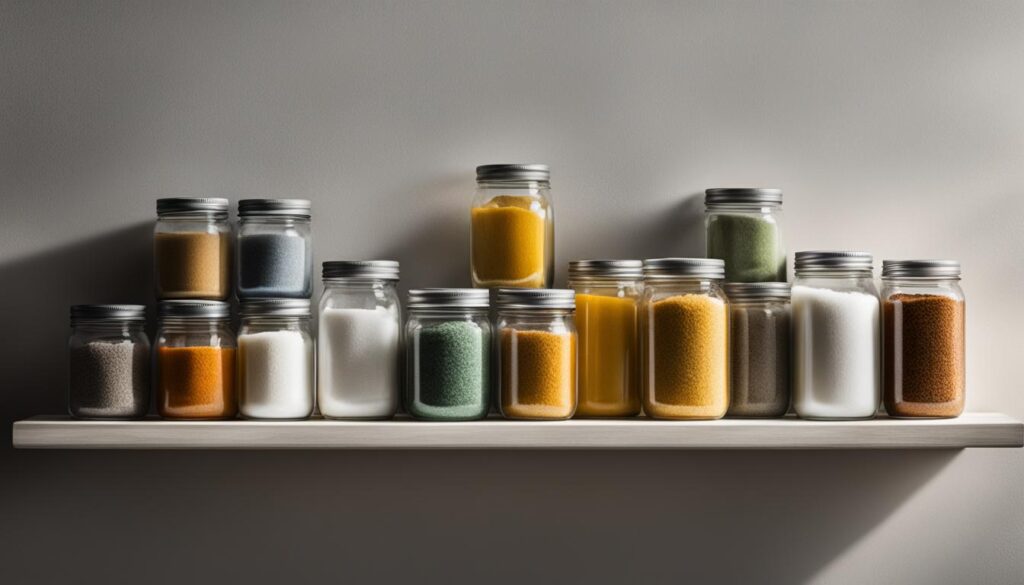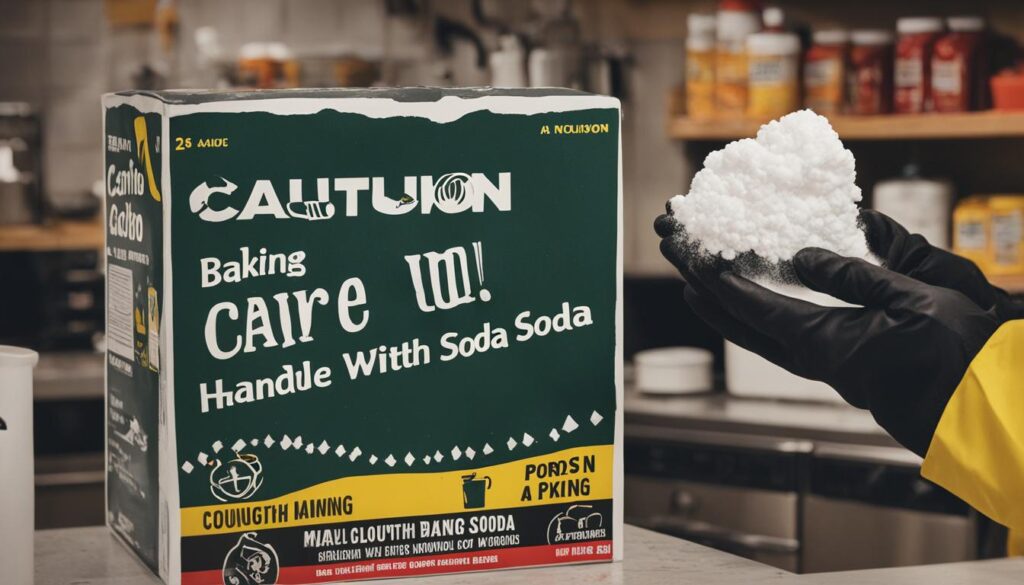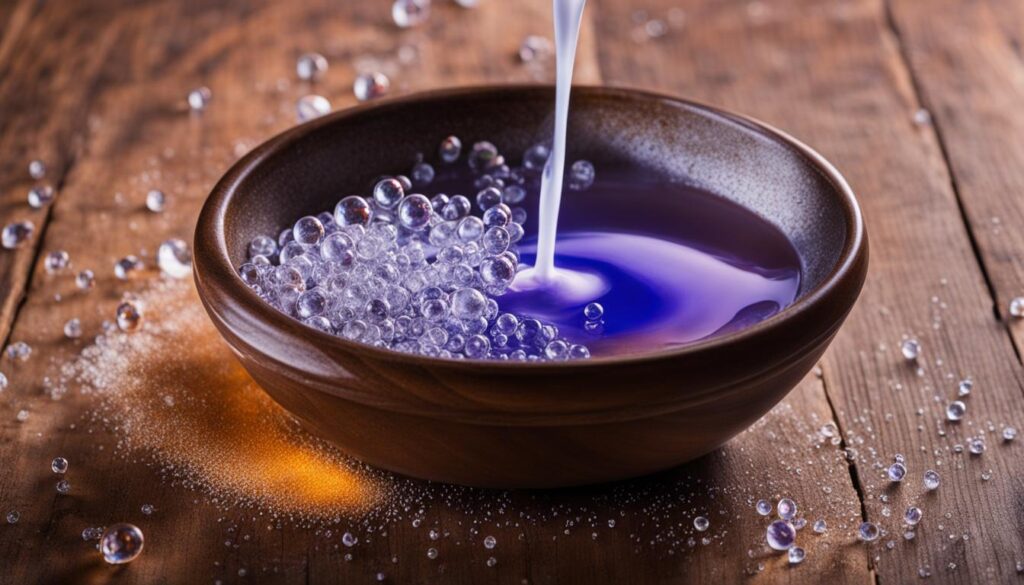Baking soda, also known as sodium bicarbonate, is a versatile and invaluable ingredient that transcends culinary boundaries and finds a place in various aspects of our lives. It offers numerous benefits for health, skin, and home uses. In this article, I will explore the introduction, composition, health benefits, culinary uses, purchasing and storage tips, as well as precautions and potential side effects associated with baking soda.
Key Takeaways:
- Baking soda, or sodium bicarbonate, is a versatile ingredient with benefits for health, skin, and home uses.
- It can act as an antacid, promoting digestion and relieving symptoms of acid reflux and heartburn.
- Baking soda has mild abrasive properties that make it effective for oral health, promoting gentle teeth cleaning and oral hygiene.
- It can be used as a soothing agent for skin conditions like sunburn and insect bites due to its anti-inflammatory properties.
- In the culinary world, baking soda acts as a leavening agent, tenderizer, and pH balancer for various dishes.
Understanding Baking Soda: Introduction and Composition

Baking soda, also known as sodium bicarbonate (NaHCO3), is a remarkable white crystalline powder that serves as a vital ingredient in baking. Its history is fascinating, dating back centuries, and its applications extend beyond the culinary world. Derived initially from plant ashes, baking soda has found a place in both cooking and practical uses.
In baking, baking soda acts as a leavening agent, creating the essential rise and texture in baked goods. Its ability to release carbon dioxide when exposed to heat or an acidic environment helps dough and batter expand, resulting in fluffy and light treats.
Let’s take a closer look at the composition of baking soda:
| Chemical Formula | NaHCO3 |
|---|---|
| Appearance | White crystalline powder |
| Solubility in Water | Highly soluble |
| Taste | Mild, slightly alkaline |
| Odor | No distinctive odor |
The chemical formula of baking soda, NaHCO3, indicates its composition, which consists of sodium (Na), hydrogen (H), carbon (C), and oxygen (O). When combined, these elements form crystals that dissolve readily in water.
Baking soda’s mild taste, coupled with its alkaline nature, allows for its versatility in various dishes, making it an indispensable ingredient in the kitchen. Beyond the realm of baking, its applications encompass personal care, cleaning, and even as an antacid for digestive ailments.
Now that we have explored the introduction and composition of baking soda, let’s delve deeper into its numerous health and culinary benefits.
Notable Quote:
“Baking soda’s multifaceted composition and wide-ranging uses make it an indispensable ingredient for both cooking and practical purposes.”
Health Benefits of Baking Soda
Baking soda is not just an essential ingredient in baking; it also offers a range of health benefits when used properly. Let’s explore some of the ways baking soda can contribute to our well-being.
Maintaining Digestive Health
One of the primary health benefits of baking soda is its ability to act as an antacid. The alkaline nature of baking soda allows it to neutralize excess stomach acid, providing relief from acid reflux and heartburn symptoms. Consuming a solution of baking soda mixed with water can help alleviate discomfort and promote digestion.
Promoting Oral Hygiene
Baking soda possesses mild abrasive properties that make it effective for oral health. It has been used for decades as a natural toothpaste and teeth whitener. Its gentle abrasiveness helps remove plaque and stains from teeth, promoting a brighter smile. Additionally, baking soda’s alkaline nature creates an unfavorable environment for harmful bacteria, reducing the risk of oral infections.
Soothing Skin Irritations
Baking soda can be used topically to relieve skin irritations such as sunburn and insect bites. Its anti-inflammatory properties help reduce inflammation and soothe itching. You can create a paste by mixing baking soda with a small amount of water and applying it directly onto the affected area for relief.
Health Benefits of Baking Soda
| Health Benefit | Description |
|---|---|
| Antacid Properties | Baking soda can neutralize excess stomach acid, easing symptoms of acid reflux and heartburn. |
| Oral Health | Its mild abrasiveness helps clean teeth and fight oral bacteria, improving oral hygiene. |
| Skin Soothing | Baking soda’s anti-inflammatory properties can provide relief from sunburn and insect bites. |
It’s important to note that while baking soda has these health benefits, it should be used in moderation and according to recommended guidelines. Consult with a healthcare professional for specific advice and precautions.
Culinary Uses of Baking Soda

In the culinary world, baking soda proves to be an indispensable ingredient that goes beyond its role as a leavening agent in baking. Its versatility allows it to serve multiple roles, enhancing the taste, texture, and presentation of various dishes.
Baking soda excels as a leavening agent, creating aeration and lift in dough and batter. This process results in lighter, fluffier, and more tender baked goods, such as cakes, muffins, and cookies. Incorporating it into your baking recipes can elevate the overall quality of your creations.
Moreover, this culinary gem possesses the ability to tenderize meat effectively. When applied to certain cuts of meat, baking soda breaks down proteins, resulting in a more tender and juicy texture. This technique is particularly beneficial for tougher cuts of meat, making them more enjoyable to consume.
Additionally, baking soda can play a role in balancing the pH level of certain dishes. For instance, it can help reduce the acidity in tomato-based sauces, providing a milder flavor profile and enhancing the overall taste. By using baking soda judiciously, chefs can achieve the perfect balance of flavors in their culinary creations.
Benefits of Baking Soda in Culinary Uses:
- Acts as a leavening agent for lighter and fluffier baked goods
- Tenderizes meat for improved texture and taste
- Balances the pH level of dishes, reducing acidity
With its culinary prowess, baking soda proves to be a versatile ingredient that can transform ordinary dishes into extraordinary culinary delights.
| Baking Soda in Culinary Uses | Benefits |
|---|---|
| Acts as a leavening agent | Creates aeration and lift in dough and batter, resulting in lighter and fluffier baked goods |
| Tenderizes meat | Breaks down proteins, improving texture and taste |
| Adjusts pH level | Balances acidity in dishes like tomato-based sauces |
Types of Baking Soda and Purchasing Tips

When it comes to baking soda, there are different types available to meet your specific needs. From standard granulated baking soda to convenient baking soda tablets, each variation has its own advantages and applications.
If you prefer the traditional form, standard granulated baking soda is the go-to choice. It is versatile and can be used for various culinary purposes, such as leavening dough and batter or tenderizing meat. Moreover, it is also an essential ingredient for natural cleaning solutions and personal care remedies.
For those seeking convenience and portability, baking soda tablets offer a practical alternative. These tablets are pre-dosed and ready to use, making them ideal for on-the-go situations or precise measurements. They can be easily added to recipes or dissolved in water for instant relief or cleaning purposes.
When purchasing baking soda, it’s essential to choose a reputable brand that provides a clear, tightly sealed container. This ensures the quality and freshness of the product, preventing any moisture or contaminants from affecting its efficacy. Look for brands known for their commitment to quality and customer satisfaction.
Proper storage is equally important to maintain the potency of baking soda. Keep it in a cool, dry place away from moisture and direct sunlight to prevent clumping or loss of effectiveness. A tightly sealed container is crucial for preserving freshness and prolonging its shelf life.
Whether you choose standard granulated baking soda or convenient baking soda tablets, purchasing high-quality baking soda from a trusted brand and ensuring proper storage are essential for optimum results and longevity.
Storage Tips for Baking Soda

Proper storage is essential to ensure the longevity and effectiveness of baking soda. By following these simple tips, you can keep your baking soda fresh and ready for all your culinary and cleaning needs.
Avoid Moisture and Clumping
Moisture is the enemy when it comes to storing baking soda. It can cause the powder to clump together, making it difficult to use and measure. To prevent this, keep your baking soda in a cool, dry place. A pantry or cupboard away from the stove or sink is ideal.
Shield from Direct Sunlight
Exposure to direct sunlight can compromise the efficacy of baking soda. Ultraviolet (UV) rays can break down its chemical composition and reduce its effectiveness. It’s best to store baking soda in an opaque container or transfer it to a dark-colored jar to shield it from light.
Tightly Seal the Container
Proper sealing is crucial to maintain the freshness of baking soda. When not in use, make sure to tightly seal the container to prevent air and moisture from entering. This will help preserve its potency and ensure it lasts longer.
By following these storage tips, you can keep your baking soda in prime condition and ready for all your culinary adventures and cleaning endeavors.
| Storage Tips for Baking Soda |
|---|
| Avoid Moisture and Clumping |
| Shield from Direct Sunlight |
| Tightly Seal the Container |
Precautions and Side Effects of Baking Soda

While baking soda offers numerous benefits, it’s important to use it in moderation and with caution. Overconsumption or excessive use can lead to negative effects such as electrolyte imbalances, digestive issues, and alkalosis, a condition where the body becomes too alkaline.
“It’s crucial to recognize that baking soda is not a cure-all and should be used responsibly. Excessive consumption can disrupt the body’s natural balance and cause harm,” warns Dr. Linda Johnson, a renowned nutritionist.
Electrolyte imbalances can result from the disruption of sodium and potassium levels in the body. This can cause symptoms such as muscle cramps, weakness, and irregular heartbeat. It’s important to be mindful of the recommended dosage and consult a healthcare professional before incorporating baking soda into your daily routine.
Digestive issues can arise when baking soda is ingested in large quantities. It can lead to gas, bloating, and discomfort in the stomach. Individuals with gastrointestinal conditions such as acid reflux or stomach ulcers should exercise caution when using baking soda for medicinal purposes.
Alkalosis, although rare, can occur when the body’s pH becomes too alkaline. Symptoms may include confusion, muscle twitching, and nausea. It’s crucial to monitor your baking soda usage and seek medical advice if you experience any unusual symptoms.
Consultation Is Key
Prioritizing your health and well-being is important when considering the use of baking soda. Medical professionals can provide personalized guidance based on your specific circumstances, helping you navigate potential risks and avoid any adverse effects.
“It’s always recommended to consult a healthcare professional before incorporating baking soda into your routine, particularly if you have underlying health conditions or are on medication,” advises Dr. Sarah Thompson, a respected internal medicine specialist.
The image above visually represents the potential side effects and precautions associated with the use of baking soda.
Baking Soda for Skin Care

Baking soda is not only a kitchen staple but also a versatile ingredient that can be beneficial for your skin. Its exfoliating and cleansing properties make it a popular choice for various skincare remedies. However, it’s important to use baking soda with caution to avoid potential side effects on your skin.
When used as an exfoliant, baking soda can help remove dead skin cells, unclog pores, and promote a smoother complexion. Its fine granules work gently to slough off the outer layer of the skin, revealing a fresh and rejuvenated appearance. Additionally, baking soda’s alkaline nature can help balance the skin’s pH level, potentially reducing excessive oiliness and minimizing the appearance of acne.
Here is a precautionary step you can take before incorporating baking soda into your skincare routine – Perform a patch test. Apply a small amount of baking soda mixed with water to a small area of your skin, preferably on the inner arm. Leave it on for about 15 minutes and rinse. Monitor your skin for any signs of irritation, redness, or discomfort. If no adverse reactions occur within 24 hours, it is generally safe to use baking soda on your skin.
“When used correctly, baking soda can be a wonderful addition to your skincare routine. It can help improve the overall texture, appearance, and health of your skin. However, it’s crucial to be mindful of its potential to disrupt the skin’s natural pH balance, leading to dryness or irritation. Always dilute baking soda with water and use it in moderation.”
Incorporating baking soda into your skincare regimen can be done in various ways:
- Baking Soda Face Scrub: Create a simple exfoliating scrub by mixing baking soda with water or a gentle cleanser. Gently massage the mixture onto your damp face in circular motions, then rinse off with water. Avoid excessive scrubbing, as it can lead to irritation.
- Baking Soda Face Mask: Combine baking soda with other skin-nourishing ingredients like honey, yogurt, or aloe vera gel to create a DIY face mask. Apply the mixture to your face and leave it on for 10-15 minutes before rinsing off. This mask can help unclog pores and improve skin texture.
- Baking Soda Bath Soak: Add a quarter to a half cup of baking soda to your bathwater to enjoy a rejuvenating soak. Baking soda can help relieve itchiness, soothe skin irritations, and leave your skin feeling refreshed.
Remember, everyone’s skin is unique, so it’s important to listen to your skin and adjust your skincare routine accordingly. If you have sensitive skin, it’s advisable to consult with a dermatologist before using baking soda on your skin.
Baking Soda as a Natural Cleaning Agent
Baking soda is not just a baking essential; it is also a powerful cleaning agent. Its versatile nature and abrasive properties make it an excellent solution for tackling stains, odors, and grease in various household settings. Whether you are cleaning countertops, sinks, or other kitchen surfaces, baking soda can be your go-to cleaning companion.
One of the remarkable qualities of baking soda is its ability to remove stubborn stains. Its fine particles act as a gentle abrasive, effectively lifting and scrubbing away dirt and grime without scratching surfaces. Simply make a paste by mixing baking soda with water, apply it to the stained area, and let it sit for a few minutes before scrubbing and rinsing.
Additionally, baking soda’s odor-neutralizing properties make it an ideal deodorizer for various spaces. Whether it’s a refrigerator that has absorbed unwanted smells or shoes that could use some freshening up, a sprinkle of baking soda can work wonders. Its ability to absorb and eliminate odors makes it an eco-friendly alternative to chemical-based deodorizers.
“Baking soda, with its natural cleaning properties, can be a game-changer in your cleaning routine. Its versatility and effectiveness make it a go-to solution for various cleaning tasks.”
Furthermore, baking soda’s multi-purpose uses extend beyond traditional cleaning areas. It can be used to freshen carpets, remove scuff marks from floors, clean silverware, and even eliminate stubborn stains from coffee mugs. Its non-toxic nature makes it safe for use around children and pets, providing peace of mind while maintaining cleanliness in your home.
To demonstrate the cleaning power of baking soda, here is a table showcasing its effectiveness in different household cleaning tasks:
| Cleaning Task | Baking Soda Solution | Results |
|---|---|---|
| Removing Stains from Countertops | Make a paste with baking soda and water. Apply, let sit for 15 minutes, then scrub. | Stains are lifted and countertops look refreshed. |
| Eliminating Odors from Refrigerators | Place an open box of baking soda in the refrigerator. | Unwanted odors are absorbed, leaving a fresh-smelling fridge. |
| Deodorizing Shoes | Generously sprinkle baking soda inside shoes. Let sit overnight, then shake out. | Shoes are odor-free and refreshed. |
| Cleaning Silverware | Create a paste with baking soda and water. Apply to silverware using a cloth, then rinse. | Silverware regains its shine and tarnish is removed. |
As shown in the table above, baking soda proves its effectiveness as a natural cleaning agent in various scenarios. Its affordability, availability, and non-toxic properties make it a popular choice among eco-conscious individuals seeking a more sustainable approach to cleaning.
Next time you’re faced with tough stains or persistent odors, consider reaching for a box of baking soda. You’ll be amazed by its cleaning power and the fresh, spotless results it can achieve.
Baking Soda as an Antacid

Baking soda can be a helpful remedy for those experiencing acid reflux or heartburn. As an antacid, it works by neutralizing excess stomach acid, providing relief from discomfort. The key to its effectiveness lies in its chemical reaction when combined with acidic substances.
When baking soda comes into contact with acids like lemon juice or vinegar, it produces carbon dioxide gas. This gas helps reduce the acidity in the stomach, alleviating symptoms of acid reflux and heartburn.
However, it’s important to note that while baking soda can provide temporary relief, recurring or chronic symptoms should be evaluated by a healthcare professional. They can offer appropriate guidance and identify any underlying conditions that may require treatment.
Remember to use baking soda as an antacid only on an occasional basis and in moderation. Regular and excessive use may disrupt the natural balance of stomach acid and lead to imbalances in electrolytes, which can have adverse effects on your health.
“While baking soda can be effective in alleviating symptoms of acid reflux, it’s crucial to use it responsibly and in consultation with a healthcare professional.”
Summary and Conclusion
Baking soda, also known as sodium bicarbonate, is a versatile ingredient that offers a wide range of benefits for both health and home uses. Its role as a leavening agent in baking makes it an essential component in numerous recipes for cakes, bread, and cookies, providing light and fluffy texture to baked goods.
However, the benefits of baking soda extend beyond the kitchen. It can serve as a natural cleaning agent, effectively tackling stains, odors, and grease on various surfaces. Additionally, baking soda possesses exfoliating and cleansing properties, making it a valuable ingredient in skincare routines, albeit with caution due to its potential to disrupt the skin’s natural pH balance.
While baking soda offers many advantages, it is important to use it responsibly and in moderation. Excessive consumption or overuse may lead to negative effects, such as electrolyte imbalances and digestive issues. Consulting with professionals and experts is advisable when considering the integration of baking soda into your daily routine.
FAQ
What is baking soda?
Baking soda, also known as sodium bicarbonate (NaHCO3), is a white crystalline powder commonly used as a leavening agent in baking.
What are the health benefits of baking soda?
Baking soda offers several health benefits, including acting as an antacid to relieve symptoms of acid reflux and heartburn, promoting oral health, and providing soothing properties for skin conditions like sunburn and insect bites.
How can baking soda be used in cooking?
Baking soda serves multiple roles in culinary applications. It acts as a leavening agent, tenderizes meat, and balances the pH of certain dishes.
What types of baking soda are available, and what purchasing tips should I keep in mind?
Baking soda is available in standard granulated form and in tablet form. When purchasing, look for brands with tightly sealed containers to maintain quality.
How should I store baking soda?
To ensure the longevity of baking soda, store it in a cool, dry place away from moisture and direct sunlight. Tightly seal the container to maintain freshness.
Are there any precautions or side effects associated with using baking soda?
While baking soda offers many benefits, overconsumption or excessive use can lead to negative effects such as electrolyte imbalances, digestive issues, and alkalosis. Consult a healthcare professional before incorporating baking soda into your routine.
How can baking soda be used for skincare?
Baking soda can be used for exfoliation and cleansing due to its properties. However, use it with caution as it may disrupt the natural pH of the skin and lead to dryness or excess oil production.
Can baking soda be used as a natural cleaning agent?
Yes, baking soda’s abrasive properties make it effective for cleaning stains, odors, and grease on surfaces like countertops and sinks. It can also be used as a natural deodorizer.
Is baking soda effective as an antacid?
Yes, baking soda can be used as an antacid to neutralize excess stomach acid, reducing symptoms of acid reflux and heartburn.
What are the benefits of using baking soda overall?
Baking soda is a versatile ingredient that offers benefits in terms of baking, health, skincare, and cleaning. However, it should be used responsibly and in moderation.






